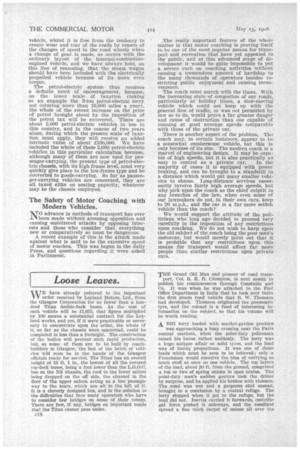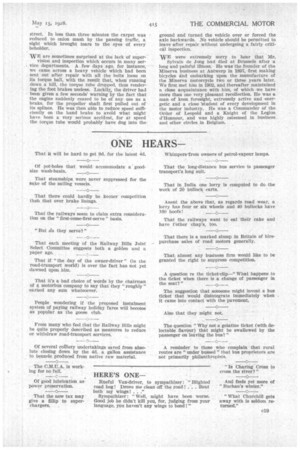Loose Leaves.
Page 40

Page 41

If you've noticed an error in this article please click here to report it so we can fix it.
WE have already referred to the important order • received by Leyland Motors, Ltd., from the Glasgow Corporation for no fewer than a hundred Titan double-deck buses. As the cost of each vehicle will be £1,655, that figure multiplied by 100 means a substantial contract for the Leyland works, and yet, if it were practicable or necessary to concentrate upon the order, the whole of it, so far as the chassis were concerned, could be completed in less than a fortnight. The construction of the bodies will prevent such rapid production, but, as some of them are to be built by coachbuilder in Glasgow, the last of the batch of vehicles will S0011 be in the hands of the Glasgow officials ready for service. The Titan has an overall height of 13 ft. 1 in., the lowest of all the covered top-deck buses, being a foot lower" than the L.G.O.C. bus on the NS chassis, the roof to the lower saloon being dropped on the off side, the channel in the floor of the upper saloon acting as a low passageway to the seats, which are all to the left of it.
It is a cleverly designed bus, and is the to . the difficulties that face many operators who have to consider low bridges on some of their routes. There are few, if any, bridges on important roads that the Titan cannot pass under.
c18
THE Grand Old Man and pioneerof road trans
port, Col. R. E. B. Crompton, is next month to publish his reminiscences through Constable and Co. It was when he was attached to the Post Office Department in India that he took over there the first steam road vehicle that B. W. Thomson had developed. Thomson originated the pneumatic tyre, and the colonel is a fund of interesting information on the subject, so that his volume wiltbe worth reading, BIG lorry loaded with market-garden produce
was approaching a busy crossing near the Paris central markets, when the point-duty policeman raised his baton rather suddenly. The lorry was a huge antique affair on solid tyres, and the load was of heroic proportions. It was one of those loads which must be seen to be believed; only a Frenchman wouldconceive the idea of carrying so much stuff at once on one vehicle. The top layers of the load, about 30 ft. from the ground, comprised a ton or two of spring onions in opencrates. The point-duty man's sudden gesture took the driver by surprise, and he applied his brakes with violence. The road was wet and a gorgeous skid ensued, brought to a conclusion by a central refuge. The lorry stopped when it got to the refuge, but the load did not. Inertia carried it forwards, centrifugal force pushed it sideways, and the resultant spread a fine thick carpet of onions all over the street. In less than three minutes the carpet was reduced to onion -mash by the passing traffic, a sight which brought tears to the eyes of every beholder.
WE are sometimes surprised at the lack of super vision and inspection which occurs in many service departments. A few days ago, for instance; we came across a heavy vehicle which had been sent out after repair with all the bolts loose on its torque ball, with the result that, when running down a hill, the torque tube droriped, thus rendering the foot brakes useless. Luckily, the driver had been given a few seconds' warning by the fact that the engine suddenly ceased to be of any use as a brake, for the propeller shaft first pulled out of its splines. He was then able to reduce speed sufficiently on the hand brake to avoid what might have been a very serious accident, for at speed the torque tube would probably have dug into the ground and turned the vehicle over or forced the axle backwards. No vehicle should be permitted to leave after repair without undergoing a fairly critical inspection.
WE were extremely sorry to hear that Mr. Sylvain de Jong had died at Brussels after a long and painful illness. He was the founder of the Minerva business at Antwerp in 1897, first making bicycles and embarking upon the manufacture of the Minerva motorcycle two or three years later. We first met him in 1902, and thereafter maintained a close acquaintance with him, of which we have more than one very pleasant recollection. He was a man of keen foresight, extremely active and energetic and a close 'student of every development in the motor industry. He was a Commander of the Order of Leopold and a Knight of the Legion. d'Elonneur, and was highly esteemed in business and other circles in Belgium.












































































































